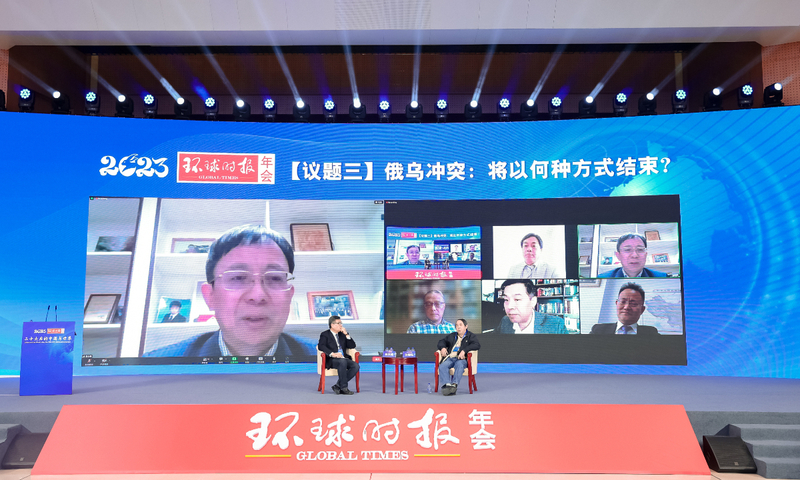(Source: Global Times, 2022-12-22)

Photo: Global Times
A prolonged and expanded Russia-Ukraine conflict will have a far-reaching impact and damage the future of the globe, and increase the risk of a runaway control and nuclear crisis, Chinese foreign affairs experts and scholars warned at the 2023 Global Times Annual Conference on Saturday.
The conflict between Russia and Ukraine is a typical 'proxy war.' The prolonged conflict in Ukraine is inevitable, and its troubles and shocks will further spill over to other parts of the world, Zhu Feng, a professor of international relations at Nanjing University, said, addressing the 2023 Global Times Annual Conference, held both online and off-line.
The US and the EU have not made substantial efforts to ease Russia-Ukraine conflict, and have even moved in the opposite direction by providing weapons and ammunition. The key to solving the crisis lies in the hands of the US and EU, Zhou Li, former vice minister of the International Department of the Communist Party of China Central Committee, noted at the conference.
There are three major uncertainties in the future development of the Russia-Ukraine conflict - direct military confrontation between Russia and NATO members, nuclear contamination in Ukraine, and Russia being forced to use nuclear weapons, Zhu said.
It is fair to say that the prolonged conflict between Russia and Ukraine is the most important strategic challenge and the most serious uncertainty facing the world today, Zhu stressed.
Both sides of the Ukraine conflict are locked in a stalemated battle of attrition, which could set the stage for a new round of escalation, the Associated Press reported recently.
Scholars have analyzed the future direction of the Russia-Ukraine conflict and underlined that currently the willingness of the parties to negotiate is far from sufficient.
For Ukraine, it is still in a military stage of counter offensive; for Russia, it hopes to adjust and regain its battlefield advantage; as for the US, it continues military support to Ukraine through advanced military equipment, so all parties are more willing to continue their military moves, according to Wu Xinbo, dean of the Institute of International Studies at Fudan University.
Wu Dahui, deputy dean of the Russian Institute of Tsinghua University, also believes that there is no overlap between the negotiating goals of Russia and Ukraine.
The US has three goals in the Ukraine conflict: to comprehensively weaken Russia, to stabilize the regime in Ukraine, and to push Europe to follow US policies, Wu Xinbo said.
He believes that it will be hard to find a clear solution to the Russia-Ukraine conflict any time soon. But 2024 could be a critical timing for resolving the conflict, given that both US and Russia will have presidential elections in 2024.
Having been drawn into the protracted and intense Russia-Ukraine conflict, and having to deal with inflation and skyrocketing energy costs, more people in the EU have realized how they have been caught in a US trap. Top European officials are furious with the Biden administration and have accused the US of profiting from the Ukraine crisis by selling gas at high prices and selling arms, Politico reported in early December.
In the modern world, countries depend on each other as part of growing globalization, such as oil and gas, which have increasingly become the new frontlines in the conflict between Russia and Ukraine. As the conflict deepens, the world could enter a post-post-Cold War era, Zhu said.
Since the collapse of the Soviet Union in December 1991, great power relations have eased and the world has entered an era of globalization. However, the Russia-Ukraine conflict is returning the world to a time of great power confrontation, and the real rivalry behind the conflict is between Russia and the US, the expert said.
It is clear that Russia-Ukraine conflict is a continuation of the Cold War conflict. Especially, the Western camp led by the US suppressed other countries with the Cold War mentality and hegemonism, expanded with so-called democracy versus freedom narrative, and maintained its geopolitical strategy, so as to maintain the economic and international order under the US' system, said Zhang Shuhua, director of the institute of political sciences at the Chinese Academy of Social Sciences.
The West wants the dividends of the post-Cold War era, which dictates that it must weaken Russia, must mire Russia in war; for the four major groups in the US - the military-conglomerates group, the energy group, the financial group, and the digital oligarchy - they have not been satisfied with the exploited profits and war dividends from the Ukraine conflict, said Wang Yiwei, director of the Institute of International Affairs at the Renmin University of China.
In addition, globalization is a relatively long-term process. These above-mentioned factors, taken together, determine the final course of the Russia-Ukraine conflict and the way to end it, Wang concluded.






